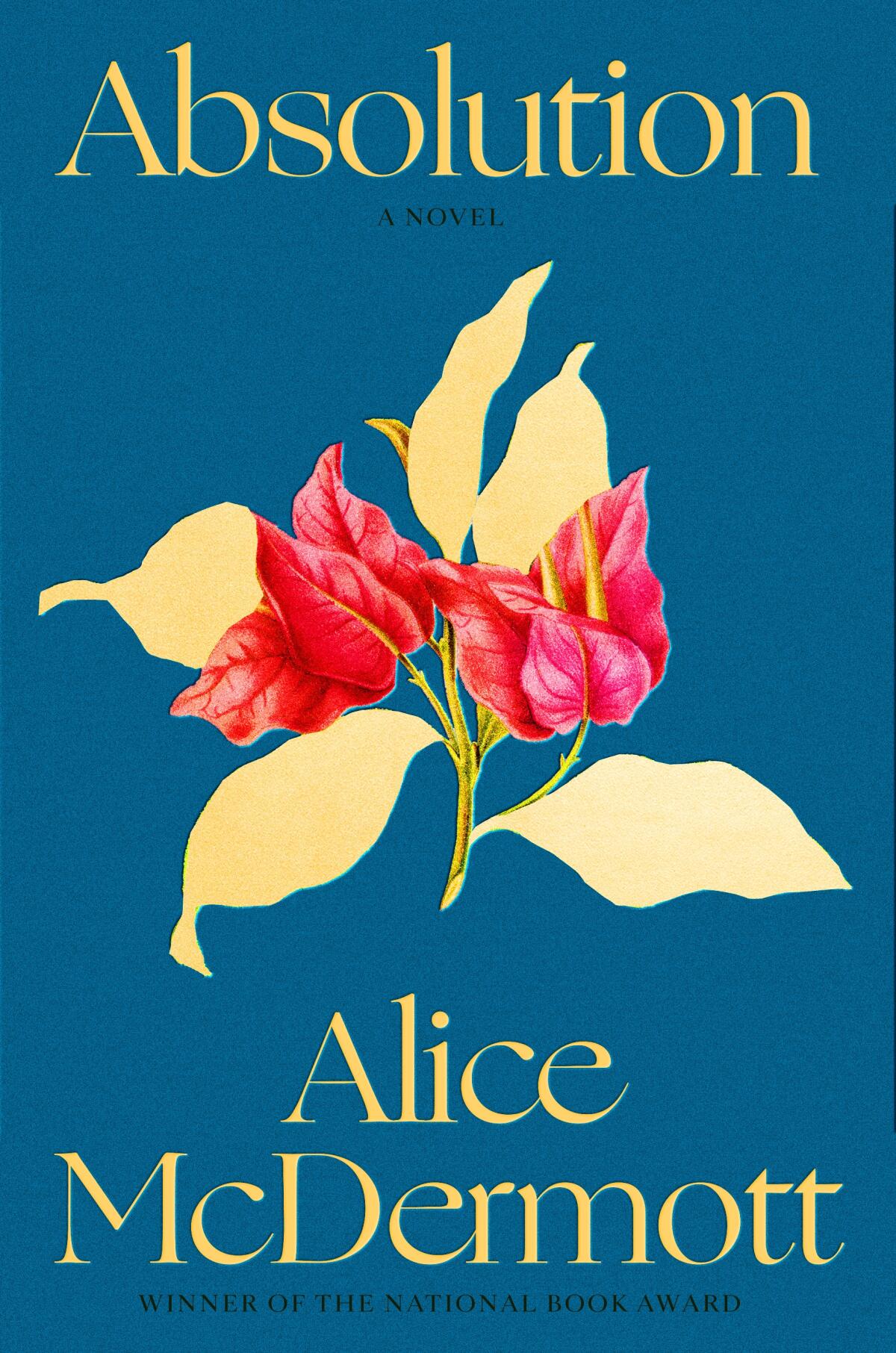‘I look for the scary story’: How Alice McDermott turned the Vietnam War novel inside out

- Share via
On the Shelf
Absolution
By Alice McDermott
FSG: 336 pages, $28
If you buy books linked on our site, The Times may earn a commission from Bookshop.org, whose fees support independent bookstores.
Alice McDermott is talking about wigs. The National Book Award-winning novelist has never worn one over her short gray hair, but according to one early reader of her new book, “Absolution,” many of its characters — women who have followed their military husbands to Saigon in the early 1960s — might have relied on them.
“He wrote that his mother and her friends, when he was 13 or so and living in the Philippines, could never be sure how their hair would look in that climate,” McDermott says during an interview over lunch not far from her home in Bethesda, Md. “It’s been hard for some of the younger people at my publisher to understand that women living in those places were putting on stockings and garter belts for garden parties when the temperature was over a hundred degrees. And they have no idea what dress shields are!”
Her youthful peals of laughter notwithstanding, McDermott is a veteran novelist, and the generational divide she mines in “Absolution,” a novel that one advance reviewer has called “her masterpiece,” is dead-serious.
If you’re looking for the literary scene in New York, you may want to drop in at Elaine’s, a shadowy but cheery East Side bar where authors meet for Beaujolais and bon mots.
Since publishing her first novel in 1987, McDermott has become perhaps our most acclaimed chronicler of the Irish American experience, warts and all. “Charming Billy,” which won a 1997 National Book Award, focused on Billy Lynch, a great guy — when he was sober. Other books have tackled suicide (“The Ninth Hour”), homosexuality (“Someone”) and, of course, family dysfunction (“At Weddings and Wakes”).
Tying them all together is the presence of Roman Catholicism. Still a practicing Catholic despite her very public disagreements with its doctrine, especially regarding women, McDermott approaches religion on the page not as a political lightning rod but as a source of faith and integrity.

“I guess what I’m looking for is not to impose, but instead let something appear, let something arise that feels essential,” she says. “It’s about the spirit and it’s about our mortality. It’s about our looking for grace. It’s about our hope for redemption. It’s about, How do we forgive one another?”
It isn’t too surprising that McDermott’s protagonist in “Absolution” is a young Irish Catholic, a Navy intelligence officer’s wife named Patricia Kelly. But her journey abroad is fresh territory for the author, far removed from her usual settings among New York City’s “white ethnic” boroughs and suburbs.
“Initially, when I heard her voice and she began to share her story, it was like: I’m going to Vietnam?” McDermott was skeptical. “But then COVID hit, and I immediately thought, I’ve had the most vivid experiences of my life through reading. I remember scenes from novels I love more than I remember any of my travels. Saigon in 1963 no longer exists. It’s an imagined place, even for people who were there.”
Bethanne Patrick’s November highlights include new fiction from Michael Cunningham, a wild alt-history from Ed Park and nonfiction on COVID, mental illness and AI.
The story began with an image. “At first, I saw it as writing an origin story for a Barbie doll dressed in a Vietnamese áo dài,” she says. In the novel, the doll belongs to Rainey, the daughter of Charlene, an executive wife whom Patricia meets at a (vividly drawn) dinner party. When Rainey’s Barbie has a wardrobe mishap, Charlene’s seamstress whips up a white silk miniature version of the traditional Vietnamese dress.
Rainey’s doll — inspired by a story McDermott once heard at a real-life party — gives Charlene an idea for one of her money-making schemes. From this origin story, the novel came to life.
Complicating what McDermott insists is not a historical novel, Patricia’s narration addresses a grown-up Rainey, who plays a part in the story. “I knew that my narrator was not a woman who would tell her story unless somebody asked her,” McDermott says. “She would have to be invited to speak. And I knew that before the book started, there’s a question. It’s not in the book, but that’s the silence at the beginning of the story.”
The retrospective telling allows Patricia to reexamine the dramatic events that followed in the wake of that garden party, forcing choices that feel both generationally specific and universal — bearing on parenthood, reproduction, families of choice. What gives “Absolution” its unique depth is that neither the vulnerable newcomer Patricia nor the sophisticated, heedless Charlene has cornered the market on all virtues.
If McDermott’s moral ambiguity reminds readers of the Vietnam War writ large, it feels very intentional. She has taken the worn tapestry of the war novel and turned it inside out, exposing the original colors and throwing the battles and bivouacs into stark relief. And yet the themes are the same — misguided notions of what it means to save people, and to believe in a deity supporting “our side.”
Kevin Powers was among the best in a wave of novelists on Iraq and Afghanistan. His new thriller, “A Line in the Sand,” signals their slow fade from relevance.
Patricia’s generation of women, McDermott says, were part of their era’s hidden history, “the good soldiers who made things easier for the men they followed.” She points to a key moment in the novel, “a line Rainey writes in her mother’s obituary. It’s a moment of cruelty, of a woman judging another woman without understanding the other’s experience, and I think that’s the smallest, most intense tragedy.”
McDermott confesses that she sometimes worries readers will miss such brief, telling moments. “I don’t write stories for easy answers,” she says. “I look for the scary story, for the moment when what you thought you were going to say becomes something completely different and slips away from your control.” She sips her iced tea and continues. “I think it’s the agreement that you make with the reader, that if I put it in the novel, there’s a reason for it to be there, and I trust you. I don’t have to knock you upside the head to say, ‘Look! Look at this!’”
When I mention Kirkus Reviews’ proclamation about “Absolution” being her masterpiece, McDermott demurs; she hasn’t read her reviews since novel No. 1. “Actually, my husband said this to me the other night: ‘Do you think this is your best book?’ And I said, you know what? Hearing someone say that, it’s like you’ve had eight children and someone points to one and says, ‘Oh, well, that one is cute.’”
Then she laughs and changes the subject. “That reminds me, I realized at one point that if I were a male writer working on a story about this time and place, and all my characters were men, I would have made the one really good person in the book, whose name is Dominic, the pretty nurse.”
Instead, in McDermott’s story, Dominic — an Army officer — becomes the bridge between Patricia’s experience and Rainey’s, the one who puts them back in touch decades later. That’s not a spoiler. It’s more of a reminder that “Absolution” is a rare work, a novel that subverts the idea of battlefield stories and, in doing so, actually awakens readers to the true scope of war.
More to Read
Sign up for our Book Club newsletter
Get the latest news, events and more from the Los Angeles Times Book Club, and help us get L.A. reading and talking.
You may occasionally receive promotional content from the Los Angeles Times.












